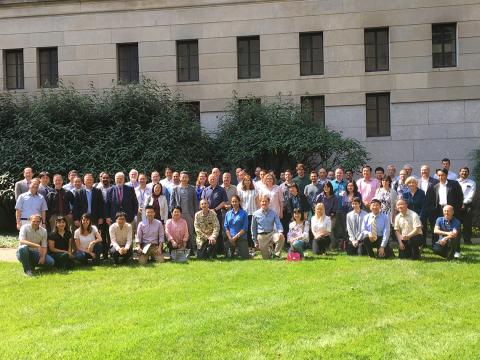Mattson, Expert on Brain Aging, Science of Fasting, Retires

Photo: Ernie Branson
Dr. Mark Mattson, renowned for his research on brain aging, Alzheimer’s disease and the health benefits of calorie restriction and intermittent fasting, retired from the National Institute on Aging recently. During his distinguished career, Mattson inspired peers and lab teammates with his diligent work ethic and research productivity. He remains recognized as one of the world’s most highly cited neuroscientists, with a long track record of achievements and numerous awards.
In June, an international symposium drew dozens of Mattson’s current and past colleagues and mentees to Johns Hopkins’ Mountcastle Auditorium to celebrate his contributions to science. Throughout the day-long symposium, speakers recalled Mattson as a mentor who led by example.
“I do not have enough words to express my gratitude to Mark for his excellent contribution to the science, for his collaborative and generous spirit toward other scientists, and for being such a good colleague, friend and mentor,” said Dr. Luigi Ferrucci, NIA scientific director. “His life is an inspiration and an example to all, and I am certain that his next journey will be adventurous and successful.”
During his almost 20 years at NIA, Mattson led the Neuroscience Research Laboratory, which focused on understanding what goes wrong in the brain in Alzheimer’s and Parkinson’s diseases and stroke. His team made numerous discoveries that revealed the cellular and molecular mechanisms by which intermittent metabolic challenges—exercise and intermittent fasting—enhance cognition and protect the brain against age-related dysfunction and degeneration.
Using mouse models, Mattson and his team found that both dietary energy restriction and intermittent fasting play a significant role in delaying and slowing the progression of neurodegenerative diseases. These findings resulted in several novel therapeutic approaches and, more recently, early-stage clinical trials testing calorie restriction and fasting diets in humans.
A native of Minnesota, Mattson received his Ph.D. in biology from the University of Iowa and then began his career at the Sanders-Brown Research Center on Aging at the University of Kentucky Medical Center. In 2000, he became chief of NIA’s Laboratory of Neurosciences with a joint appointment at Johns Hopkins University School of Medicine.
Dr. Jonathan Geiger, Chester Fritz distinguished professor at the University of North Dakota School of Medicine and Health Sciences, recalled being impressed with Mattson’s productivity while they were colleagues at Kentucky. “Once I made the mistake of asking Mark what his secret to success was,” Geiger said. “He made it clear to me that there is no secret, no trick, to being successful—it takes dedication and hard work!”

Photo: Chip Rose
Mattson is looking forward to continuing his teaching at Johns Hopkins School of Medicine’s graduate neuroscience program. His future projects also include writing books based on his research and helping plan future studies on intermittent fasting in patients with chronic diseases.
“I deeply appreciated the opportunity to visit with former lab members and collaborators who enriched my life during the past four decades,” Mattson said. “It was wonderful to reminisce about our collective contributions to the fields of neuroscience and aging, and to contemplate our future directions in life and science. This was a highly fulfilling segment of my life and I will always have fond memories of my experiences with the many colleagues and friends that I had the great fortune of working with at NIA.”
